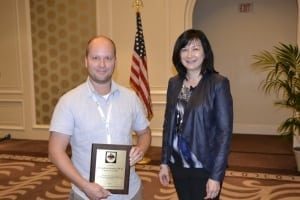Clemson professor earns Innovation Award for biodegradable work gloves, waste bin liners
December 1, 2015CLEMSON — A Clemson University researcher has discovered how to use existing biodegradable materials in a way that could save the animal co-products industry $30 million per year.
Clemson assistant professor of packaging science R. Andrew Hurley was honored with the Fats and Proteins Research Foundation’s inaugural Innovation Award for leading a team of Clemson collaborators in developing work gloves and waste bin liners made from a starch by-product left from a bio-refining process.
Since the gloves and liners are biodegradable, the advancement could dramatically reduce the problem of rendered animal co-products being contaminated by plastics used by workers along the food chain before the co-products reach the rendering process.
Approximately 55 billion pounds of animal co-products are generated annually in the U.S. as the result of meat, milk and egg production. These co-products are kept out of landfills through a rendering process that converts them into oils and proteins that are the raw materials for cosmetics, livestock feed and pet food.
“Andrew’s unconventional but practical approach to this rendering problem is likely to improve rendered product quality, and if widely adopted his innovation could add to the acceptability and value of 1.5 million tons of protein meals used as pet food ingredients,” said David Meeker, director of research for the Fats and Proteins Research Foundation (FPRF). “A conservative estimate of increased value of just one penny per pound would yield at least $30 million to the rendering industry each year.”
Hurley and Clemson’s packaging science department collaborated with Annel Greene, director of Clemson’s Animal Co-Products Research & Education Center, Clemson corporate partner Ansell and the Clemson University Research Foundation to develop the products.
Hurley and his team spent four years formulating their solution. During that time, they surveyed industry workers, tested 140 distinct polymers, sourced the material and found a manufacturer to produce thousands of prototypes for testing.
“There’s no way we could have done this without Annel Greene’s mentorship and the expertise of the Clemson University Research Foundation,” Hurley said. “FPRF has funded a lot of research at Clemson and this technology will have a direct impact on water conservation and labor and resource reduction. So, from my perspective, it was important that we put this technology to work.”
The award was presented to Hurley during the Fats and Proteins Research Foundation annual meeting in Dana Point, California.
“I think it’s good for Clemson to be involved in this sector and I think it will spawn more projects,” Hurley said. “And it’s a great feeling to make a difference in how people operate in the animal co-products industry.”
Fats and Proteins Research Foundation
The Fats and Proteins Research Foundation funds research to expand uses of rendered products and improve rendering operations. Supported by voluntary contributions from rendering companies and their industry partners, FPRF has funded more than 600 projects at 30 major academic institutions since its formation in 1962.













